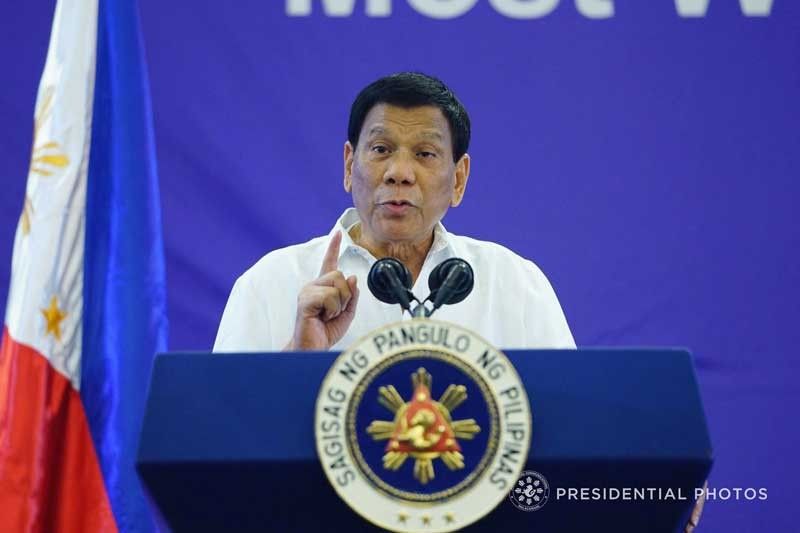Palace unfazed by drop in Duterte’s trust rating

MANILA, Philippines — Malacañang is unfazed by the 10-percent drop in President Duterte’s trust rating, thanking Filipinos yesterday for their continued confidence in him.
The sharp decline in the President’s trust rating came amid a survey showing a decrease in the number of Filipino families who considered themselves poor.
Two critics of Duterte – Reps. Tom Villarin of Akbayan and Antonio Tinio of Alliance of Concerned Teachers – yesterday said the drop in the President’s trust rating was expected because people were now realizing that his promise of change was a sham.
Duterte’s net trust rating fell to a “very good” +65 last month from an “excellent” +75 in December, according to a survey conducted by the Social Weather Stations (SWS) from March 23 to 27.
While the poll results were unfavorable to Duterte, presidential spokesman Harry Roque said they reflected a “vote of confidence” for the President.
Roque said the results were welcome and that they were grateful because the trust in Duterte remained significant despite the President being subjected to “unending criticisms and attacks.”
Roque said Duterte’s net trust ratings remained “excellent” in the Visayas and Mindanao, areas that he described as the “known bailiwicks” of the President.
He also noted that the Chief Executive’s trust ratings were still “very good” in Metro Manila and the rest of Luzon.
“Rest assured that the President will continue to steer the ship of state until we reach a drug-free destination where the country’s macroeconomic fundamentals would be strong and resilient so Filipinos could lead comfortable lives,” Roque said.
Not surprising
Villarin said the 10-point drop in Duterte’s trust ratings “confirms the people’s frustration over his lack of governance and empty promises.”
“His fist-bomb governance amplified by acoustics of violent language is becoming monotonous. People are beginning to doubt whether in the four remaining years of his term, he can deliver the change he promised,” Villarin said.
Villarin said as reflected in other surveys, people are clamoring for jobs and livelihood, not Charter change that would shift the nation to the federal system.
“Corruption in his government is also a cause for worry to our people. They are also wary that indeed, the charges leveled against him in the ICC (International Criminal Court) are true because of his withdrawal from the international tribunal,” he said.
He said the President’s foreign policy that favors China “against other traditional allies while abandoning our claims in the West Philippine Sea may have contributed to such ratings decline.”
For his part, Tinio said the President “has turned his back on core campaign promises,” thus the decline in his trust rating.
“Instead of ending the drug trade, he has instigated the mass murder of suspected drug users from among the poor while coddling known drug lords. He has walked away from his promise to end contractualization,” he said.
Duterte has implemented “anti-poor policies such as the TRAIN (Tax Reform for Acceleration and Inclusion Law),” he said.
“In short, people are learning for themselves that the President’s word cannot be trusted. It should be noted that the drop in trust ratings happened despite the best efforts of the massive ‘fake news’ apparatus deployed by the administration to shore up Duterte’s popularity,” Tinio said.
“The drop in ratings is not a fluke or temporary setback, but the start of a downward trend. As they say, you can’t fool everybody all the time,” Tinio stressed.
Self-rated poverty
Meanwhile, Roque credited the administration’s anti-poverty programs for the lower number of families who considered themselves poor in the first quarter.
The SWS survey on self-rated poverty also conducted from March 23 to 27 found 42 percent or about 9.8 million families considering themselves as poor, down from 44 percent or about 10 million families recorded in December.
The nationwide survey also found 29 percent or about 6.7 million families considering themselves food poor, three points lower than the 32 percent or about 7.3 million in December.
Roque said the Palace was pleased with the results of the survey as he assured the public that the government would continue its development programs.
“Our poverty-alleviation efforts are thus gaining ground as we continue to assure everyone that no one will be left in the Duterte administration,” Roque said in a statement.
“We would enhance our social protection mechanisms, which include quality healthcare and conditional cash transfers through revenues generated by the first package of the comprehensive tax reform program while expanding regional and countryside development to bring a comfortable life to the marginalized and disadvantaged families,” he added, referring to the TRAIN Law.
The first phase of the Duterte administration’s tax reform package is expected to generate P120 billion in additional revenues. The package, which was signed into law last December, exempts those earning an annual taxable income of P250,000 and below from paying the personal income tax and raised the tax exemption for 13th month pay and other bonuses to P90,000.
- Latest
- Trending




























